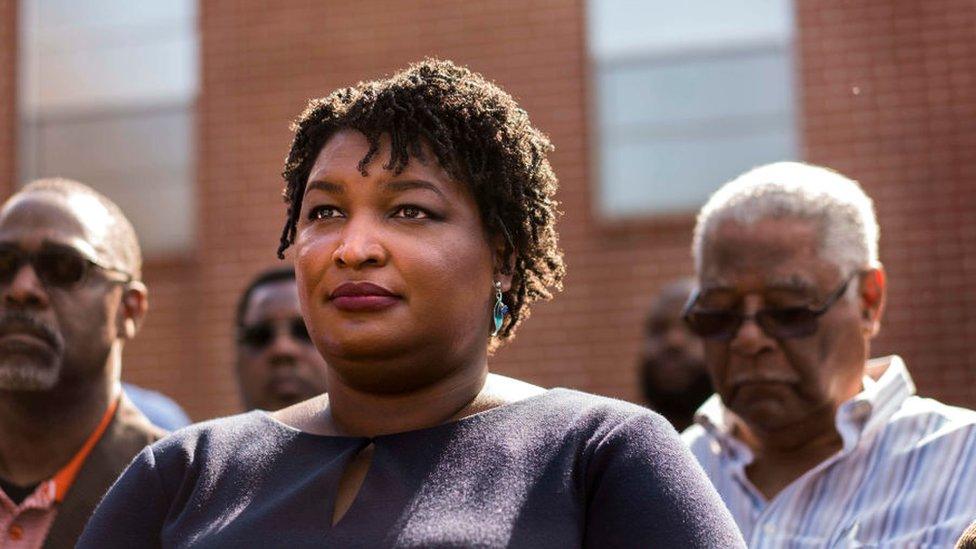Georgia: Chaos engulfs voting in White House battleground
- Published
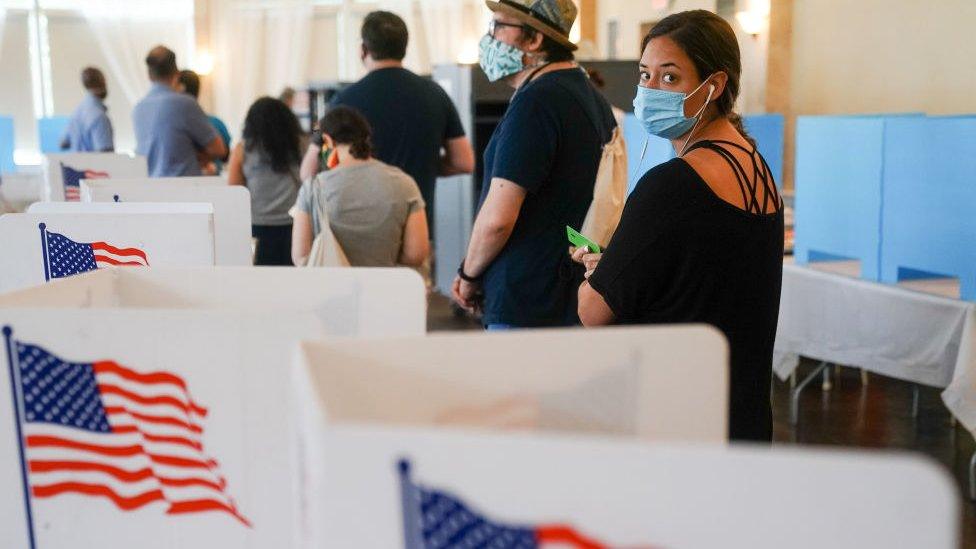
Some Atlanta voters waited for over four hours to cast their ballots
The US state of Georgia has ordered an inquiry after its primary election was marred by claims of voter suppression.
Within minutes of polls opening on Tuesday, long queues formed in the city of Atlanta, with some residents waiting hours to cast their vote.
Some areas also reported shortages of the new voting machines and a lack of back-up paper ballots.
Voters were choosing candidates for November's general election, for which the primary is seen as a preview.
US President Donald Trump and his Democratic challenger Joe Biden are expected to compete hotly for Georgia in the forthcoming battle for the White House.
Nevada, South Carolina, West Virginia and North Dakota also voted on Tuesday amid the coronavirus pandemic and unrest unseen since the 1960s.
What happened in Georgia?
Voting sites saw queues grow immediately after opening on Tuesday, in part because of social distancing. But the delays were also due to severe technical issues that made it impossible for some locations to cast any ballots.
Atlanta's Democratic Mayor Keisha Lance Bottoms took to Twitter in the morning to report that residents across the city and some suburbs were turning up to find that voting machines "are not working".
"If you are in line, PLEASE do not allow your vote to be suppressed," she continued, amid reports that frustrated residents were leaving. "PLEASE stay in line."
Georgia Congresswoman Lucy McBath also alleged "voter suppression" was the reason for the massive delays, tweeting: "Unacceptable. Our citizens have a right to vote. Plain and simple."
What did voting officials say?
Before voting was finished for the day, Georgia Secretary of State Brad Raffensperger, who is in charge of state elections, opened an investigation into the way voting was conducted in Fulton and DeKalb counties.
In an interview with WAGA-TV, he called the situation "unacceptable" and promised "to determine what these counties need to do to resolve these issues before November's election".
Georgia House Speaker David Ralston, who is like Mr Raffensperger a Republican, has also called the state legislature to investigate the voting issues.
What was the problem?
Mr Raffensperger said the problems were due to a variety of factors, including the lack of experienced poll workers who stayed away over fears of the coronavirus.
This is Georgia's first election with a new $104m (£81m) voting system, which introduces paper ballots to the state's elections for the first time in 18 years, according to the Atlanta Journal-Constitution newspaper.
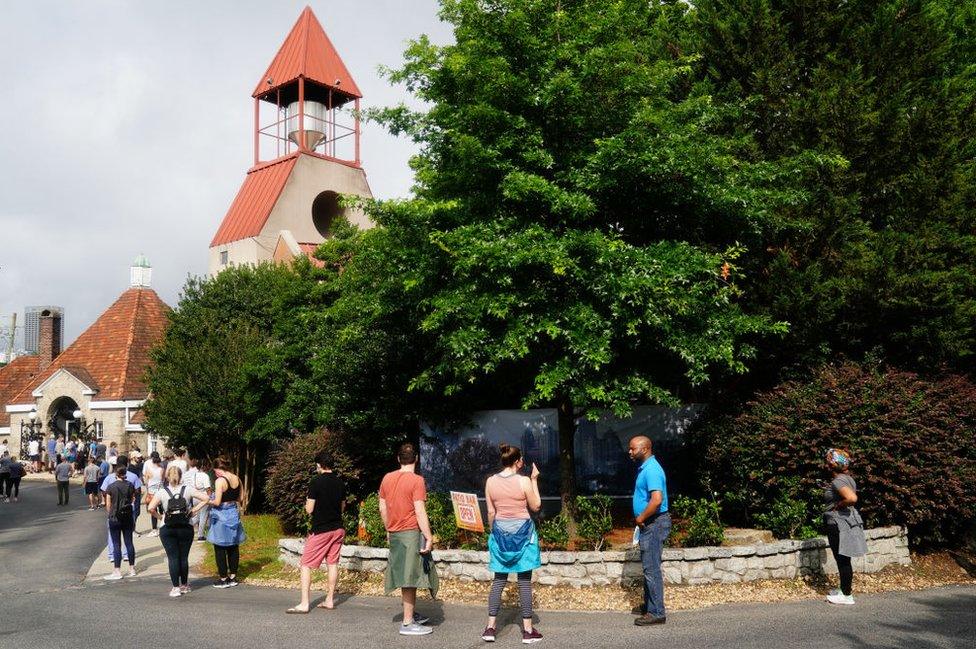
Queues are polling stations began forming before 07:00 local time
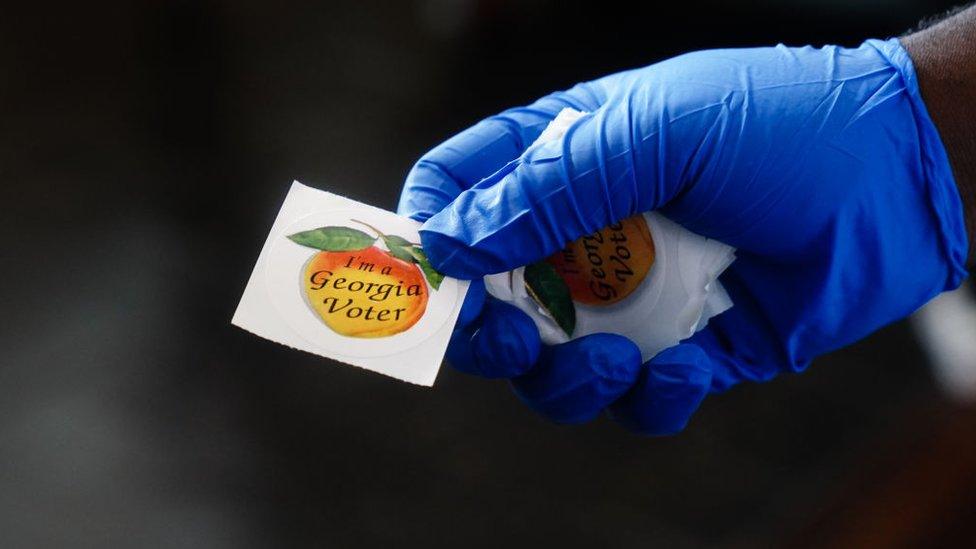
Voters are handed a sticker saying they voted
The system uses touchscreen computers to print out paper ballots.
Earlier on Tuesday, Statewide Voting Implementation Manager Gabriel Sterling who is responsible for the new system, said in a statement through the secretary of state's office: "So far we have no reports of any actual equipment issues."
"We do have reports of equipment being delivered to the wrong locations and delivered late. We have reports of poll workers not understanding setup or how to operate voting equipment," he continued, adding that over 2,000 precincts across the state have not reported problems.
"While these are unfortunate, they are not issues of the equipment but a function of counties engaging in poor planning, limited training, and failures of leadership."
Mr Sterling also took to Twitter to accuse Fulton County - where Atlanta is located - of chronic voting problems.
Allow X content?
This article contains content provided by X. We ask for your permission before anything is loaded, as they may be using cookies and other technologies. You may want to read X’s cookie policy, external and privacy policy, external before accepting. To view this content choose ‘accept and continue’.

Allow X content?
This article contains content provided by X. We ask for your permission before anything is loaded, as they may be using cookies and other technologies. You may want to read X’s cookie policy, external and privacy policy, external before accepting. To view this content choose ‘accept and continue’.

Hundreds of volunteer poll workers - who tend to be over the age of 70 - quit in the weeks before the election due to fears of the ongoing coronavirus epidemic.
"Even the poll workers don't know what to do," DeKalb County Commissioner Mereda Davis Johnson told the Journal-Constitution.
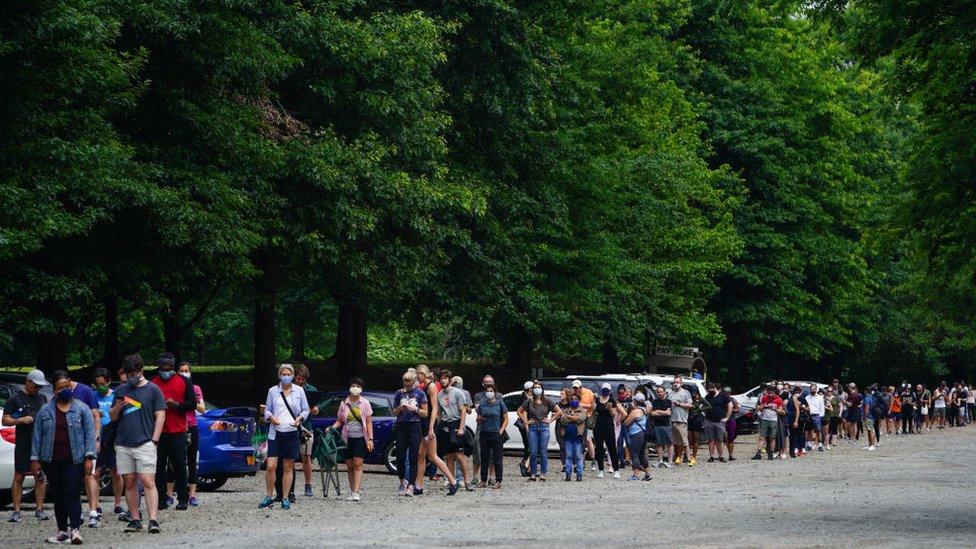
"These are new machines and you expect people to run them in less than a couple of months? If this is a preview of November, then we're in trouble."
Basketball superstar LeBron James tweeted that the chaos indicated that "how we vote is also structurally racist".
Nearly one million absentee ballots were cast even before Tuesday's election, officials say. The record high is believed to be due to residents fears of the coronavirus.
In 2018, Georgia was again plagued by voting scandal, after gubernatorial candidate Stacey Abrams refused to concede to then-Secretary of State Brian Kemp claiming that the vote was hampered by suppression efforts from Republicans.
The unlikely coronavirus hotspot in a forgotten corner of Georgia
- Published29 October 2018
